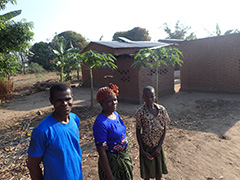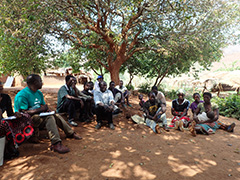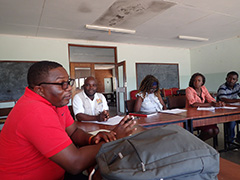- Home
- Technical Cooperation Projects
- Index of Countries
- Africa
- Malawi
- Project for Market-Oriented Smallholder Horticulture Empowerment and Promotion (MA-SHEP)
- Project News
- MA-SHEP conducted Gender Monitoring in the 2nd Batch Target Areas and Gender Basic Survey in the 3rd Batch Target Area
Project News
2019-11-01
MA-SHEP conducted Gender Monitoring in the 2nd Batch Target Areas and Gender Basic Survey in the 3rd Batch Target Area
For the 3 days from 15th to 18th of October, 2019, Ms. Aya Yamaguchi (Senior Advisor on Gender and Development), Mr. Gordon Yiwonbe (Principal Agriculture Gender Roles and Extension Support Services Officer of Salima Agricultural Development Division (ADD)) and Mr. Tsuyoshi Gomi (MA-SHEP Expert in Horticultural Production and Extension) conducted a gender monitoring and evaluation in the 2nd Batch implementation districts. The main purpose was to survey and to confirm the implementation status and results of gender-related activities by the target farmer group after gender awareness training in Rumphi and Karonga districts under Mzuzu and Karonga ADDs.
The focus group discussion for the target farmer group was divided into male group and female group. As a result of the discussion, it was observed that each farmer has made Visioning (the method of visualization by drawing their 3 years' visons and milestones) on both group and household levels and they have been working for achieving their vision. In addition, through participation in gender awareness training by frontline staff, target farmers understand the gender differences in terms of the viewpoint of opportunities, constraints, needs, visions, roles & responsibility, and decision making. After understanding the differences, farmers share opportunities and role & responsibility equally among male and female in households. Finally, it was confirmed that they make decisions jointly in the households. For example, there are the impacts which solar panels and TV were purchased after discussion in the household. In this way, it was observed that there are several cases which joint decision making is done in household, on the other hand, male still dominated in decision making processes in some households.
For the 3 days from 20th to 23rd of October, 2019, Ms. Yamaguchi, Mr. Kenneth Chaula (Senior Agriculture Extension Officer-Gender and HIV Programming of Department of Agricultural Extension Service) and Mr. Gomi conducted a gender basic survey in the 3rd Batch implementation districts. The survey was conducted in Mwanza and Nsanje Districts under Blantyre and Shire Valley ADDs. The main purpose of the survey is to understand gender issues and to improve gender awareness training (ToT) materials which will be organized on March, 2020.
After group discussion for the farmer group, it was observed that most of farmers understand gender differences regarding opportunities, constraints, needs, vision, role & responsibility, and decision making. On the other hand, it seems that joint decision making has not yet been achieved in households. For example, in case of farming activities, both male and female cooperate each other from sowing to harvesting. However, selling product is mainly handled by male and cash income is controlled by male. Based on the observation, in the implementation of the MA-SHEP in the 3rd Batch target areas, we would like to put emphasis on the importance of joint-decision making.
 There is the impact which solar panels were purchased from the sales of agricultural products after the discussion in the household in Karonga district
There is the impact which solar panels were purchased from the sales of agricultural products after the discussion in the household in Karonga district
 The focus group discussion for the female members of the target group in Rumphi District
The focus group discussion for the female members of the target group in Rumphi District
 The focus group discussion for District Agriculture Officers in Mwanza District
The focus group discussion for District Agriculture Officers in Mwanza District
- About JICA
- News & Features
- Countries & Regions
- Our Work
- Thematic Issues
- Types of Assistance
- Partnerships with Other Development Partners
- Climate Change / Environmental and Social Considerations
- Evaluations
- Compliance and Anti-corruption
- Science and Technology Cooperation on Global Issues
- Research
- JICA Development Studies Program / JICA Chair
- Support for the Acceptance of Foreign HRs / Multicultural and Inclusive Community
- Publications
- Investor Relations
